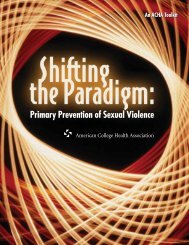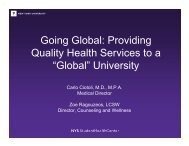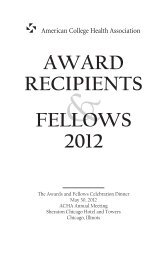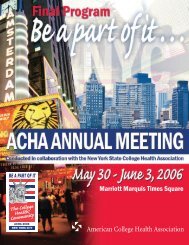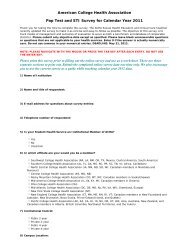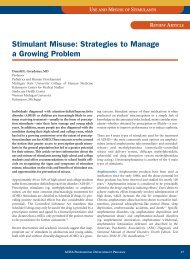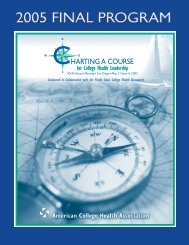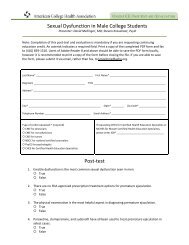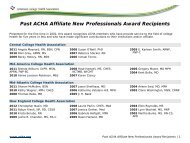Final Program [5.4MB pdf] - American College Health Association
Final Program [5.4MB pdf] - American College Health Association
Final Program [5.4MB pdf] - American College Health Association
- No tags were found...
Create successful ePaper yourself
Turn your PDF publications into a flip-book with our unique Google optimized e-Paper software.
ACHA 2008 ANNUAL MEETINGSCHEDULE OF PROGRAMS AND EVENTSTHURSDAY General Sessions10:00 AM - 11:30 AM (cont.)47 TH123. Prescriptive PracticeRegulations for Physicians and Mid-levelPractitionersRoom: New York & New OrleansCME:1.5 AAFP-P:1.5 CH:1.5 CECH:0 PsyCE:0 NBCC:0 PhCE:0The attendee should be able to:1. Identify the persons responsible for drugcontrol in your institution.2. Describe when to properly prescribe acontrolled substance.3. List the DEA prescribing guidelines.Presenter(s): Robert Fairneny, BSBA, CPA(Controlled Substance Security Consultants, Inc.)Presider: Angela E. Bower, MBA, CNP (DominicanUniversity)Facilitator: Deborah Marino, ARNP (FloridaInstitute of Technology)48 TH183. Stress and BurnoutManagement Strategies for <strong>Health</strong>Promotion ProfessionalsRoom: Crystal C & DCME:0 AAFP-P:0 CH:1.5 CECH:1.5 PsyCE:0 NBCC:0 PhCE:0The attendee should be able to:1. Define the concept of stress.2. Identify common sources of stressexperienced by health promotionprofessionals.3. Discuss negative consequences of stressand the imperative of identifying andemploying effective coping strategies.4. Identify effective modalities that can beemployed, including mindfulness-basedSeated Chair MassageThursday, June 5, 12:30 PM-4:00 PMFriday, June 6, 7:00 AM-1:00 PMRoom: ACHA Exhibit HallSponsored by the Pacific Coast <strong>College</strong><strong>Health</strong> <strong>Association</strong>An on-site professional masseuse willadminister this highly effective techniquethat provides an immediate sense of tranquility.Chair massage helps decrease stresssymptoms, fatigue, muscle tightness, andtension in the neck, arms, and shoulders.strategies and motivational enhancementtechniques that can be applied toprofessionals.Presenter(s): Jennifer Haubenreiser, MA(Montana State University); Gina Baral Abrams,MPH, LSW, CHES (Princeton University); MichelleBurcin, MPH, PhD (University of South Carolina-Columbia)Presider: Amy Melichar, MEd, CHES (MarquetteUniversity)Facilitator: Rosa Emory Thomas, MPH, CHES(University of Tennessee)49 TH186. Vulnerable Students: Whoare They and What Interventions areAppropriateRoom: Crystal J1CME:0 AAFP-P:0 CH:1.5 CECH:1.5 PsyCE:0 NBCC:0 PhCE:0The attendee should be able to:1. Identify vulnerable student populations.2. Differentiate environmental, group andindividual interventions for specificgroups.3. Discuss resource availability for healtheducation and health promotion versusindividual care and counseling.Presenter(s): Stephen Caulfield, MSW (AetnaStudent <strong>Health</strong>); Jim Grizzell, MBA, MA, CHES,HFI (California State Polytechnic University-Pomona); Lynette Mundey, MD (HowardUniversity)Presider: Keith Anderson, PhD (RensselaerPolytechnic Institute)Facilitator: R. Christa Eckert, MD (TulaneUniversity)50 TH200. <strong>Program</strong>ming with Purpose:Effective Ways to Reach Your CampusCommunityRoom: Crystal J2CME:0 AAFP-P:0 CH:1.5 CECH:1.5 PsyCE:0 NBCC:0 PhCE:0The attendee should be able to:1. Identify characteristics of an effectiveSHAC.2. Define evidence-based programmingguidelines.3. Discuss cultural competence.Presenter(s): Jason Gillman; Rachel Crane;Rebecca Beauregard and Derek Vanhille(University of Utah)Presider: Atul Nakhasi (University of Iowa)51 TH230. Emerging Issues RegardingHIPAA/FERPARoom: SagoCME:1.5 AAFP-P:1.5 CH:1.5 CECH:1.5 PsyCE:1.5 NBCC:1.5PhCE:0The attendee should be able to:1. Discuss HIPAA and FERPA within thecollege health field.2. Describe how to navigate when bothlaws “may” apply.3. Recite examples in the applications ofHIPAA and FERPA.Presenter(s): LeRoy Rooker (U.S. Department ofEducation)Presider: Joan Kiel, PhD, CHPS (DuquesneUniversity)Facilitator: Laura Knoblauch, MBA, RHIA(Illinois State University)52 TH231. Shifting the Paradigm:Primary Prevention of Sexual ViolenceRoom: Crystal E & FCME:1.5 AAFP-P:1.5 CH:1.5 CECH:1.5 PsyCE:1.5 NBCC:1.5PhCE:0The attendee should be able to:1. Explain the importance of primaryprevention of sexual violence.2. Explain the pathways in which alcoholimpacts sexual violence.3. Describe Bystander Intervention theoryand practice.4. Discuss how to disseminate and adoptthe toolkit on campus.Presenter(s): Robert Ward, MS (<strong>American</strong><strong>College</strong> <strong>Health</strong> <strong>Association</strong>); Terri Kersch, CHES,CPP (Rensselaer Polytechnic Institute); JoettaCarr, PhD (Western Michigan University)Presider: Robert Ward, MS (<strong>American</strong> <strong>College</strong><strong>Health</strong> <strong>Association</strong>)Facilitator: Terri Kersch, CHES, CPP (RensselaerPolytechnic Institute)Schedule subject to change without notice.42


![Final Program [5.4MB pdf] - American College Health Association](https://img.yumpu.com/49022356/42/500x640/final-program-54mb-pdf-american-college-health-association.jpg)
